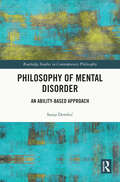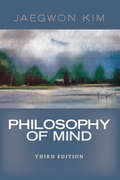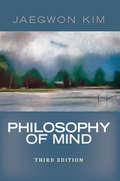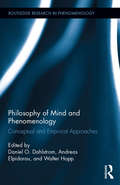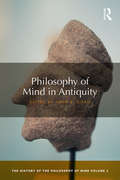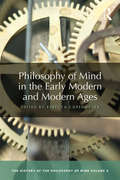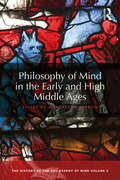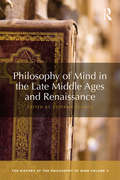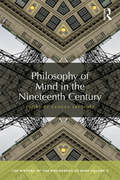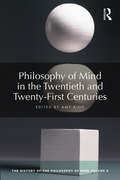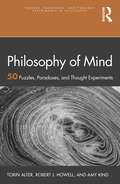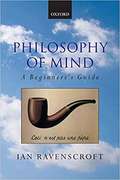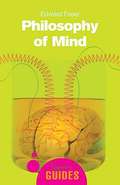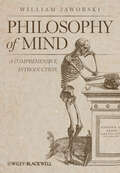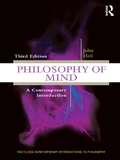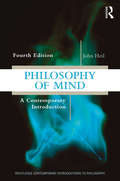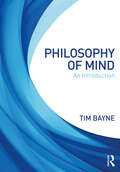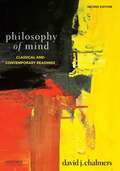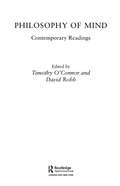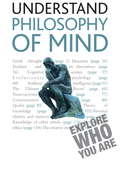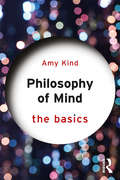- Table View
- List View
Philosophy of Mental Disorder: An Ability-Based Approach (Routledge Studies in Contemporary Philosophy)
by Sanja DembićThis book offers an ability-based view of mental disorders. It develops a detailed analysis of the concept of inability that is relevant in the psychiatric and psychotherapeutic context by drawing on the most recent literature on the concepts of ability, reasons, and harm. What is it to have a mental disorder? This book contends that an individual has a mental disorder if and only if (1) they are・in the relevant sense・unable to respond adequately to their available (apparent) reasons in their thinking, feeling, or acting, and (2) they are harmed by the condition underlying or resulting from that inability. The author calls this the “Rehability View.” This view can account for what is “mental” about mental disorders: it is the rational relations among an individual’s attitudes and actions that are “disordered,” and the relevant norms are the norms of reasons. This view is compatible with explanations of mental disorders in terms of biological dysfunctions, without reducing the former to the latter. The aim is not to offer just another conception of mental disorder, but to develop a systematic approach that incorporates insights from the philosophy of psychiatry and adjacent philosophical disciplines. Philosophy of Mental Disorder will be of interest to scholars and advanced students working in philosophy of psychiatry, philosophy of mind, philosophy of action, ethics, and mental health.
Philosophy of Mind
by Jaegwon KimKim (philosophy, Brown U. ) presents an updated third edition of the classic book which presents a concise overview of the philosophy of mind. First introduced by Descartes 400 years ago, philosophy of mind is a broad philosophical approach to consciousness and the mind-body relationship. This introductory work for upper-level philosophy students has been updated with new sections on consciousness as well as an overall improvement of the book's language flow. Annotation ©2011 Book News, Inc. , Portland, OR (booknews. com)
Philosophy of Mind
by Jaegwon KimThe philosophy of mind has long been part of the core philosophy curriculum, and this book is the classic, comprehensive survey of the subject. Designed as an introduction to the field for upper-level undergraduates and graduate students, Philosophy of Mind focuses on the mind-body problem and related issues, some touching on the status of psychology and cognitive science. The third edition has been thoroughly updated throughout to reflect developments of the past decade, and it is the only text of its kind that provides a serious and respectful treatment of substance dualism. This edition also includes two new chapters on the nature of consciousness and the status of consciousness. Improved readability and clarity has been one important aim of the new edition. Throughout the text, author Jaegwon Kim allows readers to come to their own terms with the central problems of the mind. At the same time, Kim's own emerging views are on display and serve to move the discussion forward. Comprehensive, clear, and fair, Philosophy of Mind is a model of philosophical exposition and a significant contribution to the field.
Philosophy of Mind
by Jaegwon KimThe philosophy of mind has long been part of the core philosophy curriculum, and this book is the classic, comprehensive survey of the subject. Designed as an introduction to the field for upper-level undergraduates and graduate students, Philosophy of Mind focuses on the mind-body problem and related issues, some touching on the status of psychology and cognitive science. The third edition has been thoroughly updated throughout to reflect developments of the past decade, and it is the only text of its kind that provides a serious and respectful treatment of substance dualism. This edition also includes two new chapters on the nature of consciousness and the status of consciousness. Throughout the text, author Jaegwon Kim allows readers to come to their own terms with the central problems of the mind. At the same time, Kim’s emerging views are on display and serve to move the discussion forward. Comprehensive, clear, and fair, Philosophy of Mind is a model of philosophical exposition and a significant contribution to the field.
Philosophy of Mind
by Jaegwon KimThe philosophy of mind has long been part of the core philosophy curriculum, and this book is the classic, comprehensive survey of the subject. Designed as an introduction to the field for upper-level undergraduates and graduate students, Philosophy of Mind focuses on the mind?body problem and related issues, some touching on the status of psychology and cognitive science.The third edition has been thoroughly updated throughout to reflect developments of the past decade, and it is the only text of its kind that provides a serious and respectful treatment of substance dualism. This edition also includes two new chapters on the nature of consciousness and the status of consciousness. Throughout the text, author Jaegwon Kim allows readers to come to their own terms with the central problems of the mind. At the same time, Kim's emerging views are on display and serve to move the discussion forward. Comprehensive, clear, and fair, Philosophy of Mind is a model of philosophical exposition and a significant contribution to the field.
Philosophy of Mind and Phenomenology: Conceptual and Empirical Approaches (Routledge Research in Phenomenology)
by Daniel O. Dahlstrom Walter Hopp Andreas ElpidorouThis volume identifies and develops how philosophy of mind and phenomenology interact in both conceptual and empirically-informed ways. The objective is to demonstrate that phenomenology, as the first-personal study of the contents and structures of our mentality, can provide us with insights into the understanding of the mind and can complement strictly analytical or empirically informed approaches to the study of the mind. Insofar as phenomenology, as the study or science of phenomena, allows the mind to appear, this collection shows how the mind can reappear through a constructive dialogue between different ways—phenomenological, analytical, and empirical—of understanding mentality.
Philosophy of Mind in Antiquity: The History of the Philosophy of Mind, Volume 1 (The History of the Philosophy of Mind #01)
by John E SiskoSpanning 1200 years of intellectual history – from the 6th century BCE emergence of philosophical enquiry in the Greek city-state of Miletus, to the 6th century CE closure of the Academy in Athens in 529 – Philosophy of Mind in Antiquity provides an outstanding survey of philosophy of mind of the period. It covers a crucial era for the history of philosophy of mind, examining the enduring and controversial arguments of Plato and Aristotle, in addition to the contribution of the Stoics and other key figures. Following an introduction by John Sisko, fifteen specially commissioned chapters by an international team of contributors discuss key topics, thinkers, and debates, including: the Presocratics, Plato, cognition, Aristotle, intellect, natural science, time, mind, perception, and body, the Stoics, Galen, and Plotinus. Essential reading for students and researchers in philosophy of mind, ancient philosophy, and the history of philosophy, Philosophy of Mind in Antiquity is also a valuable resource for those in related disciplines such as Classics.
Philosophy of Mind in the Early Modern and Modern Ages: The History of the Philosophy of Mind, Volume 4 (The History of the Philosophy of Mind #04)
by Rebecca CopenhaverThe early modern period is arguably the most pivotal of all in the study of the mind, teeming with a variety of conceptions of mind. Some of these posed serious questions for assumptions about the nature of the mind, many of which still depended on notions of the soul and God. It is an era that witnessed the emergence of theories and arguments that continue to animate the study of philosophy of mind, such as dualism, vitalism, materialism, and idealism. Covering pivotal figures in philosophy such as Descartes, Hobbes, Kant, Leibniz, Cavendish, and Spinoza, Philosophy of Mind in the Early Modern and Modern Ages provides an outstanding survey of philosophy of mind of the period. Following an introduction by Rebecca Copenhaver, sixteen specially commissioned chapters by an international team of contributors discuss key topics, thinkers, and debates, including: Hobbes, Descartes’ philosophy of mind and its early critics, consciousness, the later Cartesians, Malebranche, Cavendish, Locke, Spinoza, Descartes and Leibniz, perception and sensation, desires, mental substance and mental activity, Hume, and Kant. Essential reading for students and researchers in philosophy of mind, enlightenment philosophy, and the history of philosophy, Philosophy of Mind in the Early Modern and Modern Ages is also a valuable resource for those in related disciplines such as religion, history of psychology, and history of science.
Philosophy of Mind in the Early and High Middle Ages: The History of the Philosophy of Mind, Volume 2 (The History of the Philosophy of Mind #02)
by Margaret CameronPhilosophy of Mind in the Early and High Middle Ages provides an outstanding overview to a tumultuous 900-year period of discovery, innovation, and intellectual controversy that began with the Roman senator Boethius (c480-524) and concluded with the Franciscan theologian and philosopher John Duns Scotus (c1266-1308). Relatively neglected in philosophy of mind, this volume highlights the importance of philosophers such as Abelard, Duns Scotus, and the Persian philosopher and polymath Avicenna to the history of philosophy of mind. Following an introduction by Margaret Cameron, twelve specially commissioned chapters by an international team of contributors discuss key topics, thinkers and debates, including: mental perception; Avicenna and the intellectual abstraction of intelligibles; Duns Scotus; soul, will, and choice in Islamic and Jewish contexts; perceptual experience; the systematization of the passions; the complexity of the soul and the problem of unity; the phenomenology of immortality; morality; and the self. Essential reading for students and researchers in philosophy of mind, medieval philosophy, and the history of philosophy, Philosophy of Mind in the Early and High Middle Ages is also a valuable resource for those in related disciplines such as Religion.
Philosophy of Mind in the Late Middle Ages and Renaissance: The History of the Philosophy of Mind, Volume 3 (The History of the Philosophy of Mind #03)
by Stephan SchmidCharacterized by many historically significant events, such as the invention of the printing press, the discovery of the New World, and the Protestant Reformation, the years between 1300 and 1600 are a remarkably rich source of ideas about the mind. They witnessed a resurgence of Aristotelianism and Platonism and the development of humanism. However, philosophical understanding of the complex arguments and debates during this period remain difficult to grasp. Philosophy of Mind in the Late Middle Ages and Renaissance provides an outstanding survey of philosophy of mind in this fascinating and still controversial period and examines the thought of figures such as Aquinas, Suárez, and Ficino. Following an introduction by Stephan Schmid, thirteen specially commissioned chapters by an international team of contributors discuss key topics, thinkers, and debates, including: mind and method, the mind and its illnesses, the powers of the soul, Averroism, intentionality and representationalism, theories of (self-)consciousness, will and its freedom, external and internal senses, Renaissance theories of the passions, the mind–body problem and the rise of dualism, and the ‘cognitive turn’. Essential reading for students and researchers in philosophy of mind, medieval philosophy, and the history of philosophy, Philosophy of Mind in the Late Middle Ages and Renaissance is also a valuable resource for those in related disciplines such as religion, literature, and Renaissance studies.
Philosophy of Mind in the Nineteenth Century: The History of the Philosophy of Mind, Volume 5 (The History of the Philosophy of Mind #05)
by Sandra LapointeBetween the publication of Kant’s Critique of Pure Reason in 1781 and Husserl’s Ideas in 1913, the nineteenth century was a pivotal period in the philosophy of mind, witnessing the emergence of the phenomenological and analytical traditions that continue to shape philosophical debate in fundamental ways. The nineteenth century also challenged many prevailing assumptions about the transparency of the mind, particularly in the ideas of Nietzsche and Freud, whilst at the same time witnessing the birth of modern psychology in the work of William James. Covering the main figures of German idealism to the birth of the phenomenological movement under Brentano and Husserl, Philosophy of Mind in the Nineteenth Century provides an outstanding survey to these new directions in philosophy of mind. Following an introduction by Sandra Lapointe, fourteen specially commissioned chapters by an international team of contributors discuss key topics, thinkers, and debates, including: German idealism, Bolzano, Johann Friedrich Herbart, Ernst Mach, Helmholtz, Nietzsche, William James, Sigmund Freud, Brentano’s early philosophy of mind, Meinong, Christian von Ehrenfels, Husserl, and Natorp. Essential reading for students and researchers in philosophy of mind, continental philosophy, and the history of philosophy, Philosophy of Mind in the Nineteenth Century is also a valuable resource for those in related disciplines such as psychology, religion, and literature.
Philosophy of Mind in the Twentieth and Twenty-First Centuries: The History of the Philosophy of Mind, Volume 6 (The History of the Philosophy of Mind #06)
by Amy KindWhile the philosophical study of mind has always required philosophers to attend to the scientific developments of their day, from the twentieth century onwards it has been especially influenced and informed by psychology, neuroscience, and computer science. Philosophy of Mind in the Twentieth and Twenty-First Centuries provides an outstanding survey of the most prominent themes in twentieth-century and contemporary philosophy of mind. It also looks to the future, offering cautious predictions about developments in the field in the years to come. Following an introduction by Amy Kind, twelve specially commissioned chapters by an international team of contributors discuss key topics, thinkers, and debates, including: the phenomenological tradition, the mind–body problem, theories of consciousness, theories of perception, theories of personal identity, mental causation, intentionality, Wittgenstein and his legacy, cognitive science, and future directions for philosophy of mind. Essential reading for students and researchers in philosophy of mind and philosophy of psychology, Philosophy of Mind in the Twentieth and Twenty-First Centuries is also a valuable resource for those in related disciplines such as psychology and cognitive science.
Philosophy of Mind: 50 Puzzles, Paradoxes, and Thought Experiments (Puzzles, Paradoxes, and Thought Experiments in Philosophy)
by Amy Kind Robert J. Howell Torin AlterImaginative cases, or what might be called puzzles and other thought experiments, play a central role in philosophy of mind. The real world also furnishes philosophers with an ample supply of such puzzles. This volume collects 50 of the most important historical and contemporary cases in philosophy of mind and describes their significance. The authors divide them into five sections: consciousness and dualism; physicalist theories and the metaphysics of mind; content, intentionality, and representation; perception, imagination, and attention; and persons, personal identity, and the self. Each chapter provides background, describes a central case or cases, discusses the relevant literature, and suggests further readings. Philosophy of Mind: 50 Puzzles, Paradoxes, and Thought Experiments promises to be a useful teaching tool as well as a handy resource for anyone interested in the area. Key Features: Offers stand-alone chapters, each presented in an identical format:- Background- The Case- Discussion- Recommended Reading Each chapter is self-contained, allowing students to quickly understand an issue and giving instructors flexibility in assigning readings to match the themes of the course. Additional pedagogical features include a general volume introduction as well as smaller introductions to each of the five sections and a glossary at the end of the book.
Philosophy of Mind: A Beginner's Guide
by Ian RavenscroftDesigned specifically for students with no background knowledge in the subject, this accessible introduction covers all of the basic concepts and major theories in the philosophy of mind. Topics discussed include dualism, behaviorism, the identity theory, functionalism, the computational theory of mind, connectionism, physicalism, mental causation, and consciousness. The text is enhanced by chapter summaries, a glossary, suggestions for further reading, and self-assessment questions.
Philosophy of Mind: A Beginner's Guide (Beginner's Guides)
by Edward FeserIn this lively and entertaining introduction to the philospohy of the mind, Edward Feser explores the questions central to the discipline.
Philosophy of Mind: A Comprehensive Introduction
by William JaworskiPhilosophy of Mind introduces readers to one of the liveliest fields in contemporary philosophy by discussing mind-body problems and the various solutions to them. It provides a detailed yet balanced overview of the entire field that enables readers to jump immediately into current debates. Treats a wide range of mind-body theories and arguments in a fair and balanced way Shows how developments in neuroscience, biology, psychology, and cognitive science have impacted mind-body debates Premise-by-premise arguments for and against each position enable readers to grasp the structure of each argument quickly and easily Diagrams and illustrations help readers absorb the more complex ideas Bibliographic essays at the end of each chapter bring readers up to date on the latest literature Written in a clear, easy to read style that is free of technical jargon, and highly accessible to a broad readership The only book to explain systematically how a hylomorphic theory such as Aristotle’s can contribute to current mind-body debates and vie with current mind-body theories Online chapters on free will and the philosophy of persons make the book a flexible teaching tool for general and introductory philosophy courses - available at www.wiley.com/go/jaworski
Philosophy of Mind: A Contemporary Introduction
by John HeilWhen first published, John Heil's introduction quickly became a widely used guide for students with little or no background in philosophy to central issues of philosophy of mind.? Heil provided an introduction free of formalisms, technical trappings, and specialized terminology.? He offered clear arguments and explanations, focusing on the ontological basis of mentality and its place in the material world.? The book concluded with a systematic discussion of questions the book raises--and a sketch of a unified metaphysics of mind--thus inviting scholarly attention while providing a book very well suited for an introductory course. This Third Edition builds on these strengths, and incorporates new material on theories of consciousness, computationalism, the language of thought, and animal minds as well as other emerging areas of research.? With an updated reading list at the end of each chapter and a revised bibliography, this new edition will again make it the indispensable primer for anyone seeking better understanding of the central metaphysical issues in philosophy of mind.?
Philosophy of Mind: A Contemporary Introduction (Routledge Contemporary Introductions to Philosophy)
by John HeilThe book is intended as a reader-friendly introduction to issues in the philosophy of mind, including mental–physical causal interaction, computational models of thought, the relation minds bear to brains, and assorted -isms: behaviorism, dualism, eliminativism, emergentism, functionalism, materialism, neutral monism, and panpsychism. The Fourth Edition reintroduces a chapter on Donald Davidson and a discussion of ‘Non-Cartesian Dualism’, along with a wholly new chapter on emergence and panpsychism. A concluding chapter draws together material in earlier chapters and offers what the author regards as a plausible account of the mind’s place in nature. Suggested readings at the conclusion of each chapter have been updated, with a focus on accessible, non-technical material. Key Features of the Fourth Edition Includes a new chapter, 'Emergence and Panpsychism' (Chapter 13), reflecting growing interest in these areas Reintroduces and updates a chapter on Donald Davidson, 'Radical Interpretation' (Chapter 8), which was excised from the previous edition Updates 'Descartes' Legacy' (Chapter 3) to include a discussion of E. J. Lowe's arresting 'Non-Cartesian Dualism', also removed from the previous edition Includes a highly revised final chapter, which draws together much of the previous material and sketches a plausible account of the mind’s place in nature Updated 'Suggested Reading' lists at the end of each chapter
Philosophy of Mind: An Introduction
by Tim BayneDevelopments in the philosophy of mind over the last 20 years have dramatically changed the nature of the subject. In this major new introduction, Tim Bayne presents an outstanding overview of many of the key topics, problems, and debates, taking account not only of changes in philosophy of mind itself but also of important developments in the scientific study of the mind. The following topics are discussed in depth: What distinguishes a physicalist conception of the mind? Behaviourism, the identity theory, functionalism, and eliminativism as accounts of the mental The nature of perception, including the issue of perceptual transparency, the admissible contents of perception, and the question of unconscious perception The nature of thought, including the language of thought hypothesis, Searle’s Chinese room argument, and the Turing test The basis of intentional content Externalist accounts of content and the ‘extended mind’ thesis Consciousness-based objections to physicalism, and illusionist and panpsychist conceptions of consciousness Theories of consciousness, including methodological issues in the study of consciousness Mental causation, including both philosophical and scientific challenges The problem(s) of other minds, including knowledge of non-human minds Self-knowledge Personal identity and the nature of the self The book features a number of boxes that provide a more in-depth look at particular issues. Also included are chapter summaries, guides to further reading, and a helpful glossary of terms. Written by a leading figure in the field, Philosophy of Mind: An Introduction is an invaluable core text for any student coming to philosophy of mind for the first time.
Philosophy of Mind: Classical and Contemporary Readings
by David J. ChalmersA collection of articles ranging from Descartes to the present, covering the major issues and controversies in the philosophy of mind.
Philosophy of Mind: Classical and Contemporary Readings
by David J. ChalmersPhilosophy of Mind: Classical and Contemporary Readings, Second Edition, is a grand tour of writings on the nature of the mind. This comprehensive collection has 79 selections that range from the classical contributions of Descartes and Avicenna to the leading edge of contemporary debates. Seven major sections cover foundational issues, consciousness, content, perception, self-knowledge and other minds, the self, and artificial intelligence. Each section opens with an introduction by the editor.
Philosophy of Mind: Contemporary Readings (Routledge Contemporary Readings in Philosophy)
by David Robb Timothy O’ConnorPhilosophy of Mind: Contemporary Readings is a comprehensive anthology that draws together leading philosophers writing on the major topics within philosophy of mind. Robb and O'Connor have carefully chosen articles under the following headings:*Substance Dualism and Idealism*Materialism*Mind and Representation*ConsciousnessEach section is prefaced by an introductory essay by the editors which guides the student gently into the topic in which leading philosophers are included.The book is highly accessible and user-friendly and provides a broad-ranging exploration of the subject. Ideal for any philosophy student, this book will prove essential reading for any philosophy of mind course. The readings are designed to complement John Heil's Philosophy of Mind: A Contemporary Introduction, Second edition (Routledge 2003), although the anthology can also be used as a stand-alone volume.
Philosophy of Mind: Teach Yourself
by Mel ThompsonWhat is your mind? How is it related to your body? What is the effect of artificial intelligence and information technology? These and many other issues are explored in TEACH YOURSELF PHILOSOPHY OF MIND. - Investigate ideas about the mind, from ancient Greece to present-day cognitive science. - Explore the concepts of memory and free will. - Consider issues relating the mind to religion and artistic creativity. - Examine the impact of information technology on our understanding of the mind and the way it works.
Philosophy of Mind: Teach Yourself
by Mel ThompsonWhat is your mind? How is it related to your body? What is the effect of artificial intelligence and information technology? These and many other issues are explored in TEACH YOURSELF PHILOSOPHY OF MIND. - Investigate ideas about the mind, from ancient Greece to present-day cognitive science. - Explore the concepts of memory and free will. - Consider issues relating the mind to religion and artistic creativity. - Examine the impact of information technology on our understanding of the mind and the way it works.
Philosophy of Mind: The Basics (The Basics)
by Amy KindPhilosophy of Mind: The Basics is a concise and engaging introduction to the fundamental philosophical questions and theories about the mind. The author Amy Kind, a leading expert in the field, examines central issues concerning the nature of consciousness, thought, and emotion. The book addresses key questions such as: What is the nature of the mind? What is the relationship between the mind and the brain? Can machines have minds? How will future technology impact the mind? With a glossary of key terms and suggestions for further reading, Philosophy of Mind: The Basics is an ideal starting point for anyone seeking a lively and accessible introduction to the rich and complex study of philosophy of mind.
